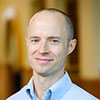This article is more than 5 years old.
For my first ZSR-sponsored professional gathering I attended the 2014 LAUNC-CH Conference in Chapel Hill with Steve Kelley and Sarah Jeong on March 10. This was a new experience for me in two ways: 1) It was my first non-law library conference, and 2) It was my first North Carolina librarian gathering. In past years I’ve attended the annual American Association of Law Libraries (AALL) meeting in July – the law equivalent of ALA – as well as a few local/regional conferences.
A main point for me was to begin to get acquainted with the NC library community. I’ve been pleased so far to find that the non-law library world is talking about many of the same things I’d had occasion to consider previously: where the library fits into a 21st-century research university’s mission, how to manage modern collections (and pay for them), etc. My experience at LAUNC-CH mirrored what I’ve experienced in general in my new position, in that it didn’t feel so very foreign or unfamiliar. Thanks to Sarah and Steve, I met some new people.
I attended presentations on integrating library instruction into online courses using Sakai at UNC’s Sloane Art Library; the methodology and findings of a UNCG survey on faculty data-management practices and needs; Emory’s new Center for Digital Scholarship; and a collaborative collection development arrangement between Duke and UNC in the areas of Middle-Eastern and Slavic Studies. There were also several lightning talks of 5 minutes apiece on a variety of fun topics, including hip-hop sampling and the restoration of an 1850’s schoolhouse.
Nancy Fried Foster, Senior Anthropologist at Ithaka S+R, was the keynote speaker. In “Designing Academic Libraries for New Ways of Research” she talked about using ethnographic methods to assess the research practices of students and faculty, emphasizing the importance of looking beyond what people self-report as their needs, and interpreting the underlying meaning. She called for “design beyond precedent”: breaking away from old metaphors and re-conceptualizing our fundamental library systems and services in order to address the real needs of modern researchers. This was the theme of the day.

3 Comments on ‘Jeff at LAUNC-CH 2014’
I just received the Ithaka S+R study for 2013 in my inbox! http://www.sr.ithaka.org/research-publications/ithaka-sr-us-library-survey-2013 We are going to be doing some of our own enthnographic studies on student study behavior in ZSR soon. It sounds like it was a very interesting day for you, Jeff!
Glad your first NC library conference was a success!
Jeff, It sounds like it was a great conference! LAUNC-CH always has great programming. I’ll have to try to go next year! Thanks for the post.